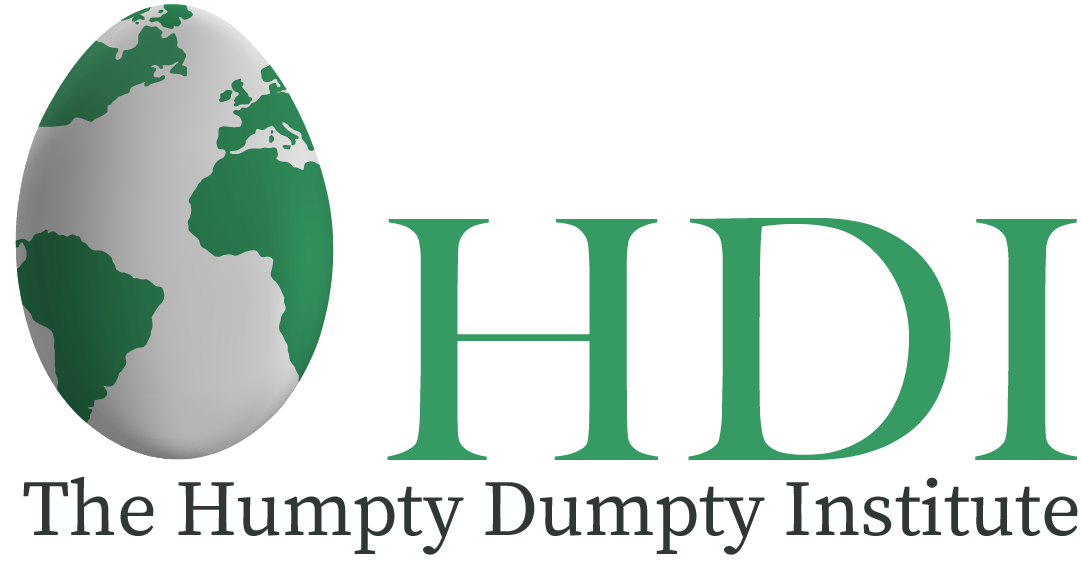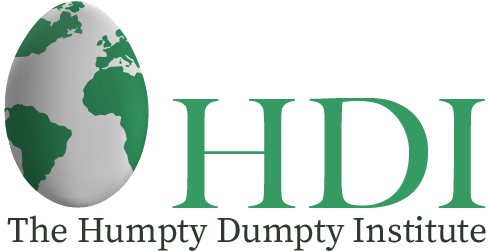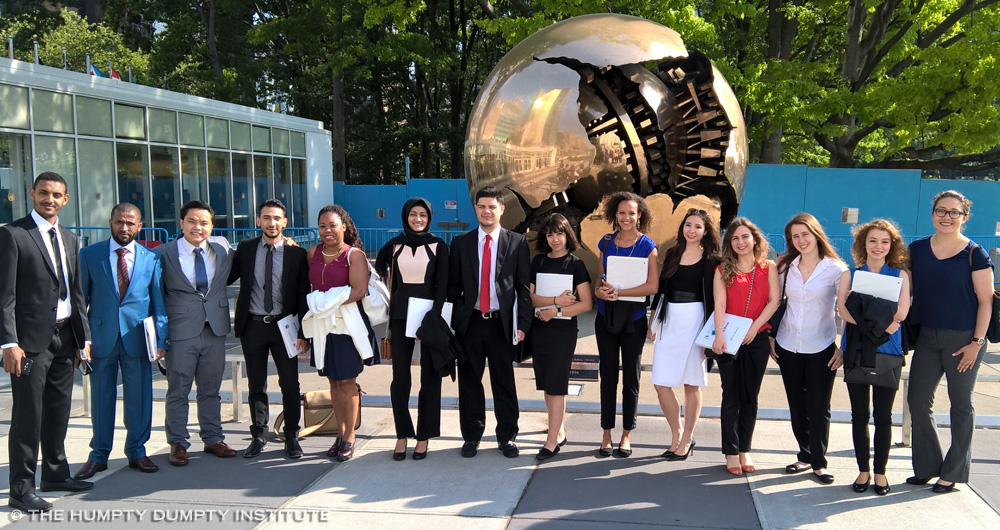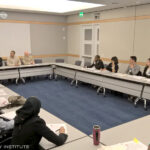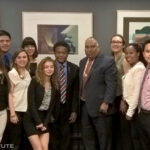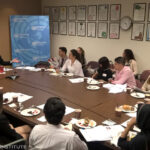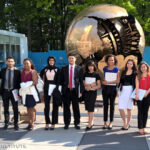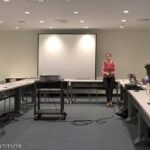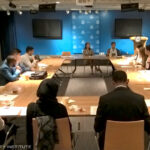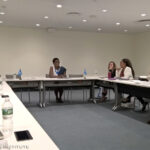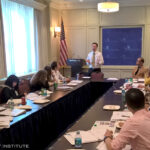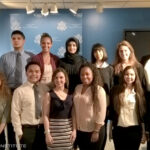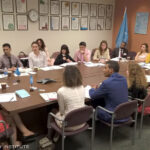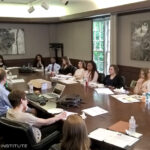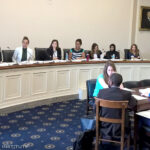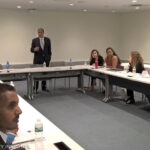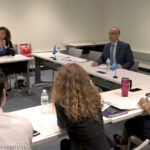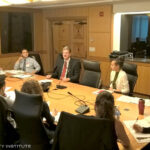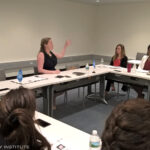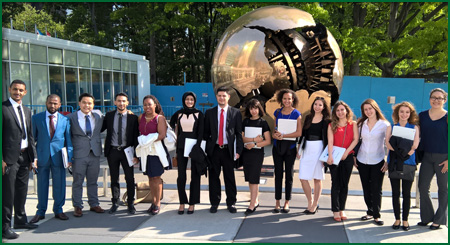 The Humpty Dumpty Institute’s annual United Nations Boot Camp took place this year from June 26 – July 2, 2016 and was a huge success. Fourteen participants from seven countries (Australia, Pakistan, Ethiopia, Guyana, Vietnam, Turkey and the United States) representing ten universities took part in HDI’s signature higher education program. HDI’s United Nations Boot Camp helps create the next generation of global leaders by connecting students with the United Nations and by building bridges between the international body and universities around the world. The UN Boot Camp provides a comprehensive range of activities, resources and opportunities for students to gain hands-on experience in global affairs. It is a week-long immersion study program that gives advanced undergraduate and graduate students the opportunity to explore, examine and experience the inner workings of world’s premier global governance body – the United Nations – as well as other international NGO’s and organizations. By the end of the Boot Camp students gained first-hand knowledge of how multilateral diplomacy is crafted and implemented, not from their textbooks, but by the practitioners themselves, senior UN officials, Ambassadors, members of the UN Diplomatic Corps, UN agency and NGO staff, American legislators and diplomats, policymakers and other leading experts in world affairs. Key topics covered include peace and security, refugees and migration, food security, counter terrorism, gender equality, climate change, wildlife conservation, peacebuilding and peacekeeping, inclusion of civil society, human rights, governance, and legislative involvement in foreign policy. A significant amount of time was also devoted to internships and career development. Participants are able to ask speakers how they arrived at their given career path and begin to explore how they can find their own.
The Humpty Dumpty Institute’s annual United Nations Boot Camp took place this year from June 26 – July 2, 2016 and was a huge success. Fourteen participants from seven countries (Australia, Pakistan, Ethiopia, Guyana, Vietnam, Turkey and the United States) representing ten universities took part in HDI’s signature higher education program. HDI’s United Nations Boot Camp helps create the next generation of global leaders by connecting students with the United Nations and by building bridges between the international body and universities around the world. The UN Boot Camp provides a comprehensive range of activities, resources and opportunities for students to gain hands-on experience in global affairs. It is a week-long immersion study program that gives advanced undergraduate and graduate students the opportunity to explore, examine and experience the inner workings of world’s premier global governance body – the United Nations – as well as other international NGO’s and organizations. By the end of the Boot Camp students gained first-hand knowledge of how multilateral diplomacy is crafted and implemented, not from their textbooks, but by the practitioners themselves, senior UN officials, Ambassadors, members of the UN Diplomatic Corps, UN agency and NGO staff, American legislators and diplomats, policymakers and other leading experts in world affairs. Key topics covered include peace and security, refugees and migration, food security, counter terrorism, gender equality, climate change, wildlife conservation, peacebuilding and peacekeeping, inclusion of civil society, human rights, governance, and legislative involvement in foreign policy. A significant amount of time was also devoted to internships and career development. Participants are able to ask speakers how they arrived at their given career path and begin to explore how they can find their own.
The Boot Camp begins in New York City and finishes the week in Washington, D.C., making the Humpty Dumpty Institute (HDI) the only organization in the country that structures its program in this capacity. Participants heard from over 25 different experts from the United Nations, the Organization of American States, the US State Department, think tanks and other international organizations.
The Boot Camp opened on Monday, June 27 with a full day of briefings at United Nations Headquarters. After a tour of the Secretariat and General Assembly buildings on the UN headquarters campus, Mr. Amir Dossal, President and Chief Executive Officer, Global Partnerships Forum started off the week by situating participants in the historical, political and physical space of the UN. The next speaker was Mohammad Reza Salamat, Senior Program Officer of the UN Secretary General’s Climate Change Support Team. He outlined the UN’s efforts to combat climate change using international treaties such as the Paris Accords. Shannon Howard, External Relations Officer at the World Food Programme was the next briefer and gave an overview of how WFP carries out its mandate responding to conflict situations around the world. The Department of Peacekeeping Operations (DPKO) was the focus of the next briefing. Suhail Khan, Women, Peace and Security Officer in the Division for Policy, Evaluation and Training at DPKO addressed UN governing frameworks through which a peacekeeping mission can be authorized by the Security Council and explained the role of UN peacekeepers to monitor and observe peace processes in post-conflict areas and assist ex-combatants in implementing peace agreements. The final session of the first day was given by Dr. Patience Stephens, Director of the Intergovernmental Support Division (IGSD) of UN Women. Dr. Stephens started by speaking of the main roles of UN Women which are; to support inter-governmental bodies, such as the Commission on the Status of Women, in their formulation of policies, global standards and norms; to help Member States to implement these standards, standing ready to provide suitable technical and financial support to those countries that request it; to forge effective partnerships with civil society, and: to lead and coordinate the UN system’s work on gender equality as well as promote accountability, including through regular monitoring of system-wide progress.
Day Two of the Boot Camp opened with a working breakfast at the United States Mission to the United Nations with a briefing on the United States Role in the United Nations by Elizabeth Tomaselli, Public Affairs Specialist, at USUN. Ms. Tomaselli spoke about the work of the Mission in supporting US priorities before the United Nations. John Ericson, Chief of the Outreach Unit at the United Nations Office of Human Resources Management then discussed many different paths to a career with the United Nations. Mr. Ericson encouraged students to explore the possibilities of working with current aid programs and offered methods of becoming involved in international work, including, the UN Young Professionals Program (YPP), UN Volunteers Program, as well as Language Competitive Examination and employment through individual and general vacancies, and internships. In keeping with current topics before the UN, the next briefer was Anne-Chris Visser, Legal Officer to the United Nations Security Council Counter Terrorism Committee Executive Directorate (CTED). Recent developments in the United Nations fight against terrorism were also touched on by Ms. Visser including the recent Security Council resolution in September 2014, which called on member states to cooperate on preventing the international flow of terrorist fighters to and from conflict zones. For the last session on Tuesday, the group travelled to the offices of the Wildlife Conservation Society at the Central Park Zoo for a briefing on international conservation efforts by Joseph Walston, Vice President for Field Conservation Programs at WCS. HDI Board Member and WCS Fellow, Deborah Landey also assisted in the presentation. WCS has devoted much time and effort to stopping the demand for banned wildlife products through education programs aimed mainly at Asian countries which are the chief importers of ivory products. After the briefing, participants were able to tour the Central Park Zoo courtesy of the Wildlife Conservation Society.
Wednesday’s activities began with a working breakfast with Ambassador Caleb Otto, Permanent Representative of the Republic of Palau to the United Nations and Ambassador Collin Beck, Permanent Representative of the Solomon Islands to the United Nations. Each ambassador outlined the severe consequences for their nations if the world’s inaction on climate change issues continues. After travelling from New York City to Washington, DC, the participants received briefings from both current and former US Department of State speakers. Jamie Lawrence, Public Affairs Officer in the Office of Academic Exchange Programs, Bureau of Educational and Cultural Affairs at the US State Department, shared the full range of Fulbright programming available through his office. The Fulbright Program operates in more than 155 countries worldwide and has provided approximately 310,000 participants with the opportunity to study, teach, or conduct research in each other’s countries and exchange ideas. James Lawrence, former Director of the Office of Weapons Removal and Abatement in the Bureau of Political-Military Affairs (PM/WRA) of the US State Department spoke with participants on his experiences in living an ‘international life’ for the past 40 years beginning as a Peace Corps Volunteer and staffer and moving to his time as a Foreign Service Officer.
Thursday morning, June 30, brought the Boot Camp participants to the offices of the United Nations Information Centre (UNIC) in Washington, DC for briefings from UNIC, the International Fund for Agricultural Development, and the UN High Commissioner for Refugees. Robert Skinner, Director of the UNIC office in Washington, related that as the United Nations’ office in the nation’s capital, the UN Information Center serves as the focal point for UN news and information to advance understanding of the UN and its work, and serves as a resource for United States government officials, NGOs, civil-society organizations and the American people. Thomas Pesek, Partnership and Resource Mobilization of the Americas Liaison Office at the International Fund for Agricultural Development was the next speaker, highlighting the UN’s role in spearheading agricultural research for small holder farming around the world. The United Nations High Commissioner for Refugees (UNHCR) Senior Advisor for External Relations and Government Affairs, Jana Mason next briefed the participants on the work of UNHCR and the context under which it operates to provide protection to vulnerable displaced populations. The group then travelled to the Heritage Foundation for a working lunch with Ted Bromund, Senior Research Fellow in the Foundation’s Davis Institute of National Security and Foreign Policy. The Heritage Foundation is a think tank whose mission is to formulate and promote conservative public policies based on the principles of free enterprise, limited government, individual freedom, traditional American values, and a strong national defense. Dr. Bromund stated that the Foundation’s view of the UN is that, to be useful, the UN must carry out its responsibilities competently and that the current organization falls very short. Thursday concluded with a visit to the Organization of American States for a briefing by Pablo Zuniga, Director of the Department of Strategic Initiatives and Public Diplomacy at the OAS who explained the similarities and differences in multilateral diplomacy as practiced by the UN and the OAS.
The final day of the Boot Camp saw the group visit Capitol Hill in the US House of Representatives Committee on Foreign Affairs Hearing Chambers in the Rayburn House Office Building. Martha Van Lieshout, Foreign Affairs Staffer in the Office of Rep. Mark Meadows (R-NC) spoke on the congressional perspective on international affairs and diplomacy and how the Committee and Congress work to keep the UN accountable as the US is the largest contributor of funding. The next session was at the United States Institute of Peace. Jeff Helsing, Associate Vice President of the Academy for International Conflict Management and Peacebuilding addressed the group and explained that USIP is an independent, nonpartisan institution established and funded by Congress to increase the nation’s capacity to manage international conflict without violence. USIP programs are designed for practitioners in governments, international organizations, non-profit organizations, and the private sector to build and strengthen the skills required for managing conflict in all its phases, from preventing conflict to post-conflict peacebuilding. The final session of the Boot Camp took place at the US Department of State Headquarters where the participants were briefed by Robert J. Faucher, Director of the Office of UN Political Affairs in the Bureau of International Organization Affairs. Mr. Faucher explained that the Bureau is the US Government’s primary conduit with the United Nations and a host of other international agencies and organizations. As such, the Bureau is charged with advancing the Administration’s vision of strong multilateral engagement as a crucial tool in advancing US national interests.
The final Boot Camp activity was a Farewell Dinner where the participants were able to share their experiences with each other and invited guests. Each participant then received a Certificate of Completion from the Institute.
